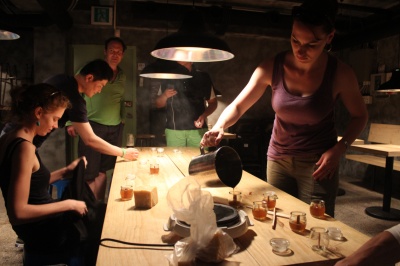
Founded in 2012, Urban Bees Seoul, Seoul’s urban beekeeping cooperative association, practices urban beekeeping through its “Bee Happy” project with an aim to better the urban environment. Honeybees play a vital part in the ecosystem, affecting approximately one-third of the pollination process of crops all over the world.
“We want to spread the value of urban beekeeping, and our vision is to ‘Act Like Bees!’” said Park Jin, the founder and leader of Urban Bees Seoul. “In fact, cities provide a better environment for the bees than countries due to factors such as higher temperature, larger variety of crops and less danger of death by pesticides.”
Around 30 people take part in Urban Bees Seoul regardless of their nationality, age and job. The participants range from teenage students to people in their 60s, novelists and patissiers. In addition, 15 of the associate members have their own bee hive.
The organization mainly provides beekeeping lessons taught by Park every Saturday for 10 weeks. As an operation method of urban beekeeping, Urban Bees Seoul puts forward two main rules: coexistence and harmony. To coexist with bees in the city, Urban Bees Seoul says people should oversee resident beekeeping as honeybees dislike vibration and movement. Moreover, beekeepers should leave food for bees and plant nectar sources for all seasons so that the bees can maintain their pollination activity all year round.
In order to pursue harmony, Urban Bees Seoul is progressing beekeeping in tune with both the bees’ ecology and the urban beekeepers’ lifestyles. The organization is also researching ways to enable city workers to conveniently raise bees.
Urban Bees Seoul continuously introduces new activities and programs as well, such as the two-day’s workshop held for foreigners in September. During the workshop, foreign participants extracted honey, made candles with natural beeswax and discussed urban beekeeping in Seoul.
“I was intrigued by these amazing creatures after watching YouTube videos of them,” said Aaron Martinson, a foreign participant at the workshop. “I will definitely get my own colony of bees in the coming spring.”
The workshop provided opportunities for foreign participants to learn more about beekeeping in Seoul.
“I have never had much chance to get answers about beekeeping in Seoul before, so this program was very informative for me as I could freely ask questions and learn a lot about the topic,” said Beryl Sinclair, a foreign participant of the workshop.
Despite the apparent international interest, members of Urban Bees Seoul are still concerned and troubled about the general negativity regarding bees.
“People have the tendency to vaguely assume that honeybees are dangerous,” Park said. “They also neglect the importance and values of bees as they are not easily spotted.”
These issues are exactly what Urban Bees Seoul is trying to overcome, and the members show a great amount of passion toward the related works.
“I have given up a rather stable position in a public enterprise in order to pursue this business in saving bees,” Park said. “In addition, I even decided on my first child’s fetus name as ‘YangBongii’ (Korean word for beekeeping).”
Currently, the ambition of Urban Bees Seoul is the sextic industrialization of honeybees. The sextic industry is the combination of the primary, secondary and tertiary industries, which are the agricultural, manufacturing and service industries, respectively.
For the agricultural sector, Urban Bees Seoul gathers natural beekeeping products such as honey, beeswax and propolis.
For the manufacturing industry, the group produces processed goods with honey and wax, then supplies their products to local bakeries or cafes.
As for the tertiary industry, Urban Bees Seoul is planning to create various contents such as educating programs about urban beekeeping, dance performances, plays for children and publication works about bees.
Urban Bees Seoul is continuously working hard like bees to enhance and develop the urban beekeeping business.
“I will work hard until the day humans and bees can live harmoniously in cities,” Park said.
Jang Ji-won
jiwon9402@ewhain.net

